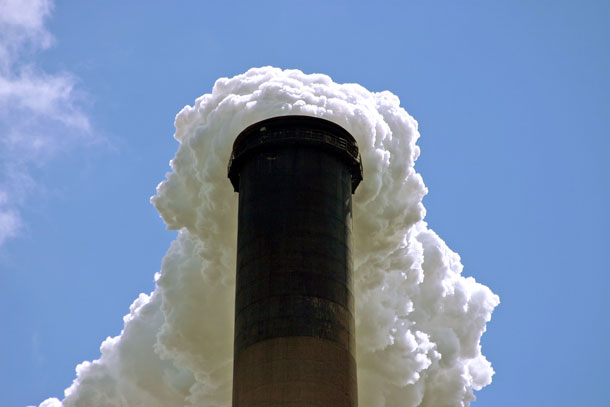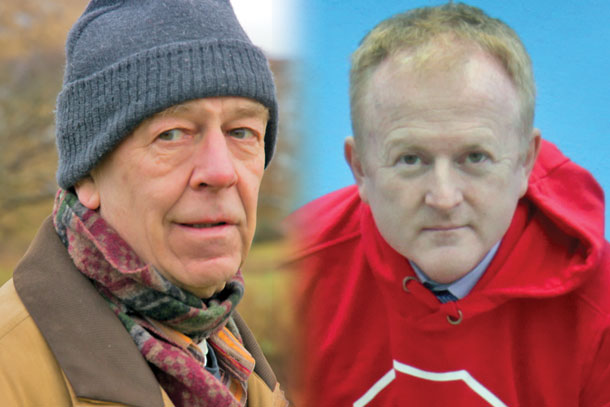2 June 2014 Edition
The Last Environmentalist
Climate change, campaigners and deniers ROBERT ALLEN on what should be a hot topic for everyone

• Air pollution is still a major problem, it affects individuals and it contributes to climate change
Politicians who fail to take the warnings of climate scientists seriously are guilty of the worst kind of moral failure
DAVID HEALY, a former Green Party councillor for Howth in Fingal County Council and erstwhile adviser to John Gormley (last seen cycling off into a green sunset), probably has the lowest carbon footprint in Ireland.
David doesn’t drive. He doesn’t use airplanes. He doesn’t eat meat. And he doesn’t buy his food from supermarkets. In other words, he is not personally responsible for any greenhouse gases.
Tony Lowes is a fellow environmentalist with a blunt axe to grind.
Years ago they came together to form a group they named Friends of the Irish Environment.
The motivation came from Lowes who could see how desperately the Irish environment needed friends. All it had, he insists, were enemies. Unfortunately, most of them are environmentalists.
It’s easy to point the finger of blame at the bureaucrats and politicians, at the captains of industry and the wage-slave workers, at consumers and blissfully ignorant miscreants.
By giving the impression they are saving the world, Ireland’s self-proclaimed environmentalists delude themselves and betray their cause.
They hold endless meetings, like green knights at a revolving round table, organise new forums not unlike the old forums, and convene public conferences that preach to the converted.
Talk, talk, talk.
All they have shown is that they are powerless to do anything about the causes of climatic and environmental damage, and are unable to influence public opinion on the changes we need to make in our lifestyles that will affect our immediate environments.
They are better at pretending, while getting on with their selfish lifestyles, which are just as damaging as ours. They hide it well.
Now we have a decision to make. Do we join the last of the real environmentalists (people like Healy, Lowes and others, in their personal choices, in their public crusades) or do we accept the inevitable?
Ireland is slowly being cast adrift – by the consequences of climate change, global warming, resource depletion and, ironically, by Europe.
Very gradually, the continent is going green.
It is doing this by beginning to carefully manage the planet’s resources, by moving away from the fuel-guzzling roads and skies onto sustainable integrated transport systems powered by non-polluting sources, by supporting local food production over environmentally harmful food imports, by encouraging the widespread growth of beneficial plant, shrub and tree species, by funding sustainable natural energy schemes, by educating the young in new ways to live.
None of this is happening in Ireland.
Our environmentalists remain elitist, our bureaucrats remain static, our media remains arrogant, our politicians remain ignorant, while the public remains apathetic and the environment . . . goes to hell and high water.
For six and a half decades, the impact of greenhouse gases on the Earth’s atmosphere has played havoc with the weather.
That great big hole in the ozone layer over Antarctica is shrinking but the scientists who study climate change are not getting excited about this discovery.
What they are doing is worrying whether our weather will return to pre-ozone-hole conditions.
The signs are that it won’t.
They fear that continuing emissions of greenhouse gases will counter the effects of ozone recovery. In particular, they fear that the jet stream (the high, fast winds that determine regional weather patterns) will remain out of control. And that will mean no cessation of the rains and winds that continue to devastate this island.
The Earth’s atmosphere is now hotter than at any time in human history, and the increase is showing no signs of slowing.
Resource depletion has been an issue for so long it is now almost dismissed as a science fiction fantasy.

• David Healy and Tony Lowes formed Friends of the Irish Environment
If you are worried about climate change and global warming, don’t be, says Caroline Lewis, another Friends of the Irish Environment veteran. “Resource depletion will get us first. Take phosphates, for example. Essential to growth, there is only enough left for 60 or 70 years at the current rate of usage.
“Until we close the phosphate cycle and stop releasing it as part of our sewage waste, for example (where it does untold damage to the environment) we will find we can’t produce enough food long before global warming does its damage.”
Then there is the pollution of the air and the water.
After the ignorant dismissal of the toxic issue by mainstream media, one fact remains: more people suffer with respiratory episodes and illnesses than ever before.
Air pollution is still a major problem. It affects individuals and it contributes to climate change.
“Because of the health aspects,” says Tony Lowes, “countries are now addressing sulphur emissions as an urgent priority. But the elimination of sulphur in the atmosphere will in turn increase the rise in surface temperature, a factor no one speaks of.”
On 13 April, after the Intergovernmental Panel on Climate Change (IPCC) reported in Berlin that greenhouse gas emissions had increased “more quickly between 2000 and 2010 than in each of the three previous decades”, the mainstream media picked a fight with its scientists.
While Rome burns . . .
Slowing deforestation and progressive afforestation have stopped emissions from land use. Trees draw carbon dioxide from the atmosphere, act as a soak for excessive precipitation, and play a part in sustaining micro-ecosystems.
Sadly in Ireland, this and other environmental initiatives do not happen.

Tree-planting is regarded as a communist conspiracy, organic farming is an elitist hippy activity, community gardening is something that only the disadvantaged of society are allowed to do, integrated transportation is non-existent in rural areas, recycling is under-funded, waste is mismanaged and natural energy creation is prohibitively expensive for individuals.
Add to that the incredible abuse of resources in the home, in the workplace, and generally where there is human activity.
But these initiatives only describe the small picture. The big picture contains scary events.
Clive Hamilton, Professor of Public Ethics at Charles Sturt University in Canberra, Australia, describes them in his latest book, Earthmasters: The Dawn of the Age of Climate Engineering.
One of them is geo-engineering, which will manipulate cloud cover, change the oceans’ chemical composition and blanket the planet with a layer of sunlight-reflecting particles.
“It is into the yawning gap between the urgent response scientists say is needed and the timid measures governments are willing to take that geo-engineering has stepped,” says Hamilton.
“Geo-engineering is not just a technological problem, nor even an ethical one as usually understood; it goes to the heart of what it means for one species to hold the future of a planet in its hands.”
Hamilton’s fear is obvious – those with the power to do something will continue to remain sceptical.
“All political leaders need to understand that we are facing a situation of the utmost seriousness,” he says. “A vast body of scientific evidence all points to human-induced climate change, putting us on a path to a disastrously transformed planet.
“Every scientific academy in the world has endorsed this science.
“It is frivolous and irresponsible for non-experts to make a personal decision to reject or downplay this vast body of evidence. Which other body of established scientific facts do they, without any expertise, choose to reject – the theory of evolution, quantum physics, the link between smoking and cancer?
“By rejecting climate science those leaders are trashing the greatest achievement of the European Enlightenment and politicians who fail to take the warnings of climate scientists seriously are guilty of the worst kind of moral failure.”
The optimists remain hopeful because they believe governments will be forced to react to the economic consequences of climate change, global warming and resource depletion.
Hardly reassuring.
So far, the governments in Dublin and London are showing no signs of understanding that short-term quick-fixes are worthless, and that bolder measures and meaningful policies are needed.
David Healy discovered that when he tried to work with the bureaucrats under Environment Minister John Gormley in the Custom House, where the department of the environment has excelled at the short-term fix.
According to Hamilton:
“We are now past the point at which dangerous climate change can be prevented, and prudence demands that we prepare for widespread change in the way our economies and societies work.”
Tony Lowes, in the Beara peninsula, remains pragmatic.
“Even afforestation is just a superficial short-term fix, buying us a little more time but not altering the overall picture. There are many good reasons for afforestation but mitigating global warming is not one.”
At a global level he argues there is no longer any consensus.
“The problem is that the model for the international agreements is broken. We have no single super-power who can impose their will on dependent nations. These dependant nations have voices, and either singly or in alliances they can and have wrecked meaningful international proposals.
“Ireland is more than a geographical distance from this kind of thinking, and yet we could play a powerful role in our own European context, which in turn could form part of the international complex of policy building blocks, which could lessen the catastrophe that is looming.
“And make no mistake – it will be the poor and downtrodden of the world who will suffer first and suffer most. But no one will escape.
“The public has no idea of how serious our situation is.”
Back in 1974, LA singer-songwriter Jackson Browne sounded like the last environmentalist on the final song of his Late for the Sky album, and here we are again 40 years later singing the same refrain.
Some of them were angry
At the way the earth was abused
By the men who learned how to forge her beauty into power
And they struggled to protect her from them
Only to be confused
By the magnitude of her fury in the final hour
And when the sand was gone and the time arrived
In the naked dawn only a few survived
And in attempts to understand a thing so simple and so huge
Believed that they were meant to live after the deluge




